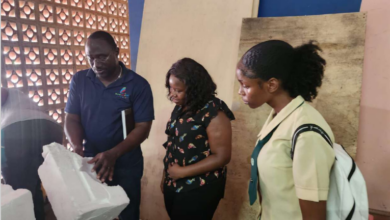(CARICOM Secretariat, Turkeyen, Greater Georgetown, Guyana) The Caribbean Community (CARICOM) Secretariat led Creativity for Employment and Business Opportunity (CEBO) programme continued with a training of trainers workshop in Trinidad and Tobago on Monday (7 April).
The project which is being funded under the CARICOM- Spain Citizen Security project is intended to enhance the capacity for sustainable livelihoods among youth by introducing CEBO in five Member States, namely, Antigua and Barbuda, Grenada, Montserrat, Saint Lucia and Trinidad and Tobago.
It follows on the work that was started previously with CEBO in six other Member States, Belize, The Bahamas, Dominica, Guyana, Jamaica and St. Kitts and Nevis with the help of the United States Agency for International Development (USAID) and the United Nations Development Programme (UNDP).
CEBO is a tool to engage, inspire and create entrepreneurial interest and action among young CARICOM nationals in and out of school and from all walks of life. It addresses psychological and social development issues and makes the link between entrepreneurship, the dreams and aspirations of young people and regional integration.
The workshop began with an opening ceremony that was attended by officials from the CARICOM Secretariat and from Trinidad and Tobago. Speaking at the ceremony, Minister of Gender, Youth and Child Development in Trinidad and Tobago, Hon. Clifton De Coteau thanked the CARICOM Secretariat for the initiative and commended the participants for taking the time to be part of the workshop.
“I know that this project will be well received not only in Trinidad and Tobago but by all Member States. I congratulate and salute you for such a worthy cause and I encourage you to continue this good work,” he said.
Programme Manager, Culture and Community Development at the CARICOM Secretariat, Dr. Hilary Brown explained that the purpose of the workshop was to train facilitators in the countries where CEBO was being rolled out for the first time and to equip them with the necessary skills to engage, motivate and transfer knowledge to a wide cross-section of young people in interactive, practical, youth-friendly and fun ways.
She said the programme was important for CARICOM Member States because it followed up on one of the commitments in The Declaration of Paramaribo on the Future of Youth in the Caribbean Community, which was issued by the Heads of Government in January 2010. She noted that CEBO also actioned one of the recommendations of the Report of the CARICOM Commission on Youth Development, which identified entrepreneurship development as a priority for countering youth unemployment, mitigating harmful behaviours such as drug abuse, crime and violence, and for fostering economic resilience.
Dr. Brown described the response received from the previous countries where CEBO has been implemented as tremendous. She said positive life changing experiences have been reported by the participants.
“They have told us how CEBO has given them hope, a second chance, a new opportunity and helped them to realize that they can contribute to their country’s development,” Dr. Brown outlined.
She said the task over the next 4 days was to share what has been learned from the CEBO pilot phase and enable the new countries to effectively implement the CEBO Programme.
She also used the opportunity to thank the International Development Partners for their support and partnership and the Government of Trinidad and Tobago for their collaboration.







